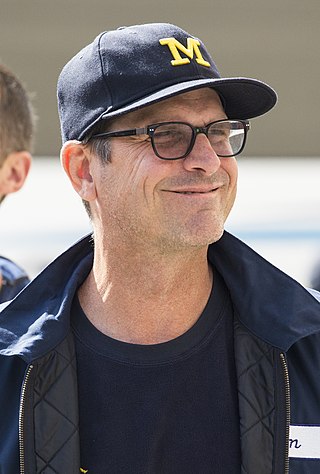
James Joseph Harbaugh is an American professional football coach and former quarterback who is the head coach of the Los Angeles Chargers of the National Football League (NFL). He previously served as the head coach at the University of Michigan from 2015 to 2023, the San Francisco 49ers from 2011 to 2014, Stanford University from 2007 to 2010, and the University of San Diego from 2004 to 2006. Harbaugh played college football at Michigan from 1983 to 1986 and in the National Football League (NFL) for 14 seasons from 1987 to 2000, with his longest tenure (1987–1993) as a player with the Chicago Bears.
Andre Previn Rison is an American former professional football player who was a wide receiver in the National Football League (NFL) for the Indianapolis Colts, Atlanta Falcons, Cleveland Browns, Jacksonville Jaguars, Green Bay Packers, Kansas City Chiefs, and Oakland Raiders. He also played in the Canadian Football League (CFL) for the Toronto Argonauts. Rison was selected to the Pro Bowl five times from 1990 to 1993 and once again in 1997.

Tai Lamar Streets is an American former professional football player who was a wide receiver in the National Football League (NFL). He was selected with the second pick of the sixth round of the 1999 NFL draft by the San Francisco 49ers. He also played for the Detroit Lions in 2004. He was the leading receiver for the national champion 1997 Michigan Wolverines football team.
Derrick Scott Alexander is an American college football coach and former professional player. He is the head football coach for Avila University, a position he has held since 2023. He played as a wide receiver in the National Football League (NFL).

Terry Albert Barr was an American football player. He played professional football for nine seasons in the National Football League (NFL) for the Detroit Lions from 1957 to 1965. He began his NFL career as a defensive back and return specialist and later became one of the best pass receivers in the NFL. He played in the Pro Bowl in both 1963 and 1964, led the NFL with 13 touchdown receptions in 1963, and was among the NFL leaders with 1,086 receiving yards in 1963 and 1,030 receiving yards in 1964. Over his nine-year NFL career, Barr appeared in 102 games and caught 227 passes for 3,810 yards and 35 touchdowns.

Donald Frederick McCauley Jr. is an American former professional football player who was a running back for the Baltimore Colts of the National Football League (NFL). He played college football for the North Carolina Tarheels from 1968 to 1970, during which time he was twice recognized as the Atlantic Coast Conference (ACC) player of the year. He was also consensus All-American in 1970 and finished ninth in voting for the Heisman Trophy.
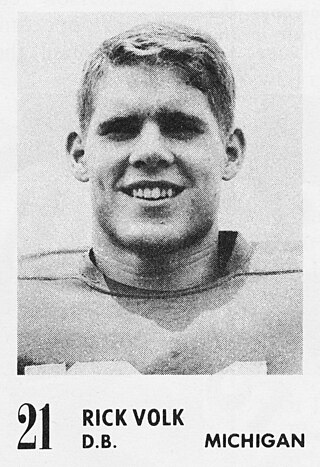
Richard Robert Volk is an American former professional football player who was a safety in the National Football League (NFL) for the Baltimore Colts, New York Giants, and Miami Dolphins. He retired with 38 career interceptions and 13 fumble recoveries, and totaled 574 yards on interception returns and 548 yards on punt returns.

The 2004 Michigan Wolverines football team was an American football team that represented the University of Michigan as a member of the Big Ten Conference during the 2004 NCAA Division I-A football season. In their tenth season under head coach Lloyd Carr, the Wolverines compiled a 9–3 record, outscored opponents by a total of 370 to 279, and tied with Iowa for the Big Ten championship. Having beaten Iowa during the regular season, the Wolverines received the Big Ten's berth in the 2005 Rose Bowl where they lost to No. 6 Texas by a 38–37 score.
The 1969 Ohio State vs. Michigan football game is considered to be one of the best-known games of the series, as well as one of the biggest upsets in college football history. The Buckeyes went into the game as the top-ranked team in the country, with a 22-game winning streak under the direction of head coach Woody Hayes. They were also defending national champions. The Wolverines went into the game under a new head coach, Bo Schembechler, who was trying to redefine a college football power that had fallen on hard times. Ohio State was playing for its second straight national title, while Michigan was playing for the Rose Bowl, and the championship of the Big Ten Conference was on the line. The game was witnessed by a (then) stadium-record crowd of 103,588 at Michigan Stadium in Ann Arbor, and began the highly combative stretch of the rivalry informally known as The Ten Year War.
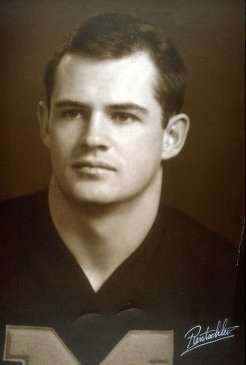
Jack David Clancy is an American former professional football player who was a wide receiver for the Miami Dolphins in 1967 and 1969 and for the Green Bay Packers in 1970. He played college football Michigan Wolverines from 1963 to 1966.

The 1969 Michigan Wolverines football team was an American football team that represented the University of Michigan in the 1969 Big Ten Conference football season. In their first year under head coach Bo Schembechler, the Wolverines compiled an 8–3 record, played in the 1970 Rose Bowl, and finished the season ranked No. 9 in the final AP poll and No. 8 in the final UPI poll.

The 1981 Michigan Wolverines football team was an American football team that represented the University of Michigan in the 1981 Big Ten Conference football season. In their 13th season under head coach Bo Schembechler, the Wolverines compiled a 9–3 record and outscored all opponents by a total of 355 to 162. Ranked No. 1 by both the AP and UPI in the preseason polls, Michigan lost to Wisconsin in its season opener, then defeated No. 1 Notre Dame the following week, and ended its season with a victory over UCLA in the Astro-Bluebonnet Bowl. The Wolverines were ranked No. 10 in the final UPI poll and No. 12 in the AP Poll.

Paul Nathan Seal is an American former professional football player. He played college football as a tight end for the University of Michigan from 1971 to 1973 and professional football as a tight end in the National Football League (NFL) for the New Orleans Saints from 1974 to 1976 and for the San Francisco 49ers from 1977 to 1979. In his six-year NFL career, Seal totaled 106 receptions, 1,586 receiving yards and seven touchdowns.

The 1979 Michigan Wolverines football team was an American football team that represented the University of Michigan in the 1979 Big Ten Conference football season. In its 100th season of intercollegiate football, the 11th under head coach Bo Schembechler, Michigan compiled an 8–4 record, lost to North Carolina in the 1979 Gator Bowl, was ranked No. 18 in the final AP Poll, and outscored opponents by a total of 312 to 151.

The 1971 Michigan Wolverines football team was an American football team that represented the University of Michigan in the 1971 Big Ten Conference football season. In their third season under head coach Bo Schembechler, the Wolverines compiled an 11–1 record, outscored opponents 421 to 83, won the Big Ten Conference championship, and were ranked No. 4 in the final UPI Poll and No. 6 in the final AP Poll. Defensive back Frank Gusich and center Guy Murdock were the team captains.

The 1970 Michigan Wolverines football team was an American football team that represented the University of Michigan in the 1970 Big Ten Conference football season. In their second season under head coach Bo Schembechler, the Wolverines compiled a 9–1 record, tied for second place in the conference, and outscored opponents by a total of 288 to 90. Michigan's victories included intersectional contests with Arizona (20–9), Washington (17–3), and Texas A&M (14–10). The team won its first nine games before losing to rival Ohio State and was ranked No. 7 in the final UPI Poll and No. 9 in the final AP Poll

The 1968 Michigan Wolverines football team represented the University of Michigan in the 1968 Big Ten Conference football season. In their tenth and final season under head coach Bump Elliott, the Wolverines compiled an 8–2 record, outscored opponents 277 to 155, and finished the season in second place in the Big Ten Conference and ranked No. 12 in the final AP Poll. After losing the season opener to California, the Wolverines won their next eight games by a combined score of 256 to 84. The team rose to No. 4 in the AP poll before losing to Ohio State by a 50–14 score in the final game of the season.
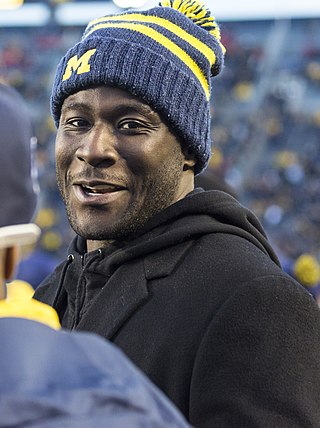
Devin Jaymes Gardner is an American former professional football player who was a quarterback. He played college football for the Michigan Wolverines. He was signed as an undrafted free agent by the New England Patriots of the National Football League (NFL). He played professionally in Japan for two seasons.

Carl Davis Ward is a former American football player. He played college football as a halfback for the University of Michigan from 1964 to 1966 and professional football in the National Football League (NFL) for the Cleveland Browns and New Orleans Saints from 1967 to 1969.
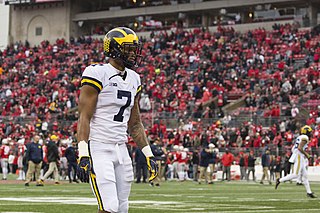
Tarik Black is an American professional football wide receiver for the Miami Dolphins of the National Football League (NFL). He played college football for the Michigan Wolverines and Texas Longhorns. He has also been a member of the Indianapolis Colts, New York Jets, and Baltimore Ravens.












